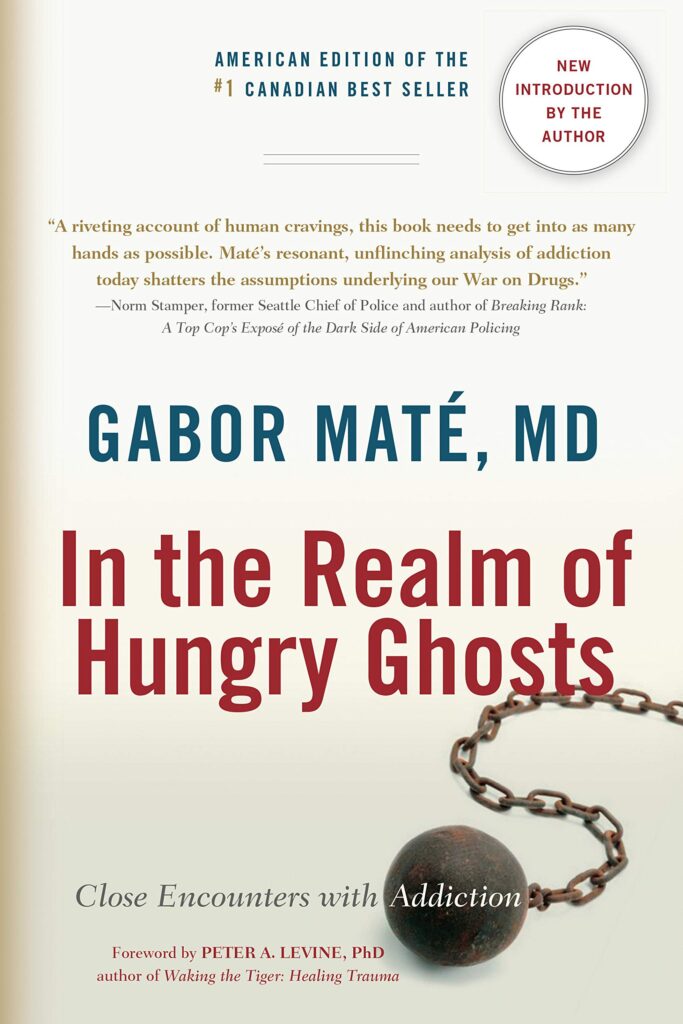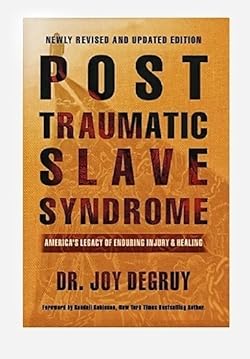In the pursuit of understanding and healing, we embark on a journey that intertwines the profound insights of Dr. Gabor Maté’s “In the Realm of Hungry Ghosts” with the challenging context of Post Traumatic Slave Syndrome (PTSS). These two realms may seem disparate, but as we delve into their depths, we uncover connections that offer unique perspectives on addiction, trauma, and the path to recovery.
In the Realm of Hungry Ghosts: Navigating the Depths of Addiction
 Dr. Gabor Maté’s seminal work, “In the Realm of Hungry Ghosts,” is a compelling exploration of addiction and its multifaceted roots. The title draws on Buddhist philosophy, referring to beings with insatiable desires, mirroring the perpetual cravings experienced by individuals grappling with addiction.
Dr. Gabor Maté’s seminal work, “In the Realm of Hungry Ghosts,” is a compelling exploration of addiction and its multifaceted roots. The title draws on Buddhist philosophy, referring to beings with insatiable desires, mirroring the perpetual cravings experienced by individuals grappling with addiction.
Maté, a distinguished physician in addiction medicine, weaves scientific research with poignant stories from Vancouver’s Downtown Eastside, a community profoundly affected by addiction. The book challenges prevailing beliefs about addiction, emphasizing the critical role of trauma—both individual and societal—in its development.
Trauma, according to Maté, is a key player in the intricate dance of addiction. The book underscores the need for compassion and holistic approaches, advocating for an understanding of the root causes rather than merely treating the symptoms. It calls for a shift in societal attitudes towards addiction, recognizing it as a complex issue requiring comprehensive and empathetic solutions.
Post Traumatic Slave Syndrome (PTSS): Understanding the Historical Trauma
 Post Traumatic Slave Syndrome is a concept developed by Dr. Joy DeGruy, describing the cumulative and intergenerational effects of trauma experienced by African Americans during slavery and its aftermath. PTSS manifests in various ways, influencing the psychological, emotional, and social well-being of individuals and communities.
Post Traumatic Slave Syndrome is a concept developed by Dr. Joy DeGruy, describing the cumulative and intergenerational effects of trauma experienced by African Americans during slavery and its aftermath. PTSS manifests in various ways, influencing the psychological, emotional, and social well-being of individuals and communities.
Key Aspects of Post Traumatic Slave Syndrome:
1. Historical Trauma:PTSS is deeply rooted in the historical trauma of slavery, where individuals and communities faced extreme brutality, dehumanization, and systemic oppression.
2. Coping Mechanisms:In response to the trauma of slavery, coping mechanisms were developed, many of which persist today. These may include self-destructive behaviors, as seen in addiction, as ways to manage the overwhelming pain.
3. Intergenerational Impact: PTSS is not confined to those who directly experienced slavery but extends across generations, impacting the descendants of those who suffered, creating a cycle of trauma and maladaptive coping.
Bridging Insights: How Principles from “Hungry Ghosts” Can Alleviate PTSS
As we explore the interconnected realms of addiction and historical trauma, we find that the principles outlined in “In the Realm of Hungry Ghosts” can offer valuable insights and potential solutions for alleviating the challenges posed by PTSS. Here are five action steps inspired by Maté’s work that can contribute to a more compassionate and holistic approach to healing PTSS:
1.Trauma-Informed Care:
– Understanding Historical Trauma:Implement trauma-informed care practices that recognize and address the historical trauma of slavery within healthcare, education, and social services.
– **Cultural Competency:** Train professionals to be culturally competent, ensuring they understand the unique challenges faced by individuals affected by PTSS and can provide appropriate support.
2. Community Healing Initiatives:
– Empowering Communities:** Foster community-based healing initiatives that empower individuals and communities affected by PTSS. This may include support groups, cultural events, and initiatives that promote resilience and connection.
– **Addressing Systemic Injustices:** Advocate for policies that address systemic injustices and promote social equity. Acknowledge the impact of historical trauma in shaping existing disparities and work towards dismantling oppressive structures.
3. Compassionate Education and Awareness:
– Education Programs:** Implement educational programs that address the historical realities of slavery and their enduring impact. Promote understanding and empathy among diverse populations to break down stereotypes and foster compassion.
– **Media Representation:** Encourage accurate and sensitive media representation of the historical experiences of African Americans. This can contribute to reshaping societal perceptions and fostering empathy.
4. Holistic Healing Approaches:
– Therapeutic Interventions:** Introduce holistic therapeutic interventions that recognize the mind-body connection. Integrative approaches such as mindfulness, yoga, and expressive arts can complement traditional therapies to address trauma and addiction concurrently.
– **Healing Circles:** Facilitate healing circles or group therapy sessions that provide a safe space for individuals affected by PTSS to share their experiences, support one another, and collectively heal.
5. Advocacy for Social Justice:
– Policy Reform:** Advocate for policy reforms that address the systemic roots of PTSS, including criminal justice reform, equitable access to education and healthcare, and economic opportunities.
– Reparations: Support initiatives for reparations that acknowledge and redress the historical injustices of slavery, providing a foundation for healing and reconciliation.
In conclusion, the journey through “In the Realm of Hungry Ghosts” and the exploration of Post Traumatic Slave Syndrome unveils a profound intersection of trauma, addiction, and the potential for healing. By embracing a holistic and compassionate approach, informed by the principles outlined by Dr. Gabor Maté, we can work towards breaking the cycles of trauma, fostering resilience, and contributing to a more just and equitable society.